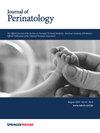The fifty billion dollar question: does formula cause necrotizing enterocolitis?
IF 2.4
3区 医学
Q2 OBSTETRICS & GYNECOLOGY
引用次数: 0
Abstract
The question of whether preterm infant formulas cause necrotizing enterocolitis (NEC) is the subject of multiple lawsuits and has daily relevance in the care of preterm infants. Research supporting the hypothesis that toxic components in infant formula cause NEC is limited to preclinical data while data from human infants are lacking. Human milk should be the first choice for most preterm infants, however, preterm infant formula is at times a critical alternative. It is the absence of human milk that increases NEC risk rather than toxic components in preterm infant formula.
价值500亿美元的问题:配方奶粉会导致坏死性小肠结肠炎吗?
早产儿配方奶粉是否会导致坏死性小肠结肠炎(NEC)的问题是多个诉讼的主题,并且在早产儿护理中具有日常相关性。支持婴儿配方奶粉中有毒成分导致NEC的假设的研究仅限于临床前数据,而缺乏人类婴儿的数据。母乳应该是大多数早产儿的首选,然而,早产儿配方奶粉有时是一个关键的选择。母乳的缺乏增加了NEC的风险,而不是早产儿配方奶粉中的有毒成分。
本文章由计算机程序翻译,如有差异,请以英文原文为准。
求助全文
约1分钟内获得全文
求助全文
来源期刊

Journal of Perinatology
医学-妇产科学
CiteScore
5.40
自引率
6.90%
发文量
284
审稿时长
3-8 weeks
期刊介绍:
The Journal of Perinatology provides members of the perinatal/neonatal healthcare team with original information pertinent to improving maternal/fetal and neonatal care. We publish peer-reviewed clinical research articles, state-of-the art reviews, comments, quality improvement reports, and letters to the editor. Articles published in the Journal of Perinatology embrace the full scope of the specialty, including clinical, professional, political, administrative and educational aspects. The Journal also explores legal and ethical issues, neonatal technology and product development.
The Journal’s audience includes all those that participate in perinatal/neonatal care, including, but not limited to neonatologists, perinatologists, perinatal epidemiologists, pediatricians and pediatric subspecialists, surgeons, neonatal and perinatal nurses, respiratory therapists, pharmacists, social workers, dieticians, speech and hearing experts, other allied health professionals, as well as subspecialists who participate in patient care including radiologists, laboratory medicine and pathologists.
 求助内容:
求助内容: 应助结果提醒方式:
应助结果提醒方式:


